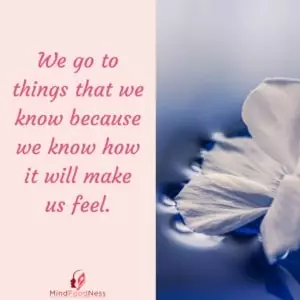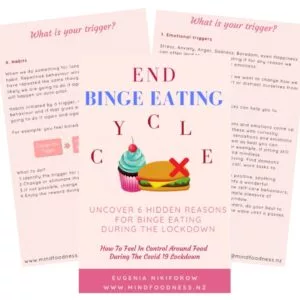
FINDING CALM WITHIN STRESSFUL AND UNCERTAIN TIMES
In these unprecedented times, it is important to acknowledge that many of us are feeling distressed in one way or another. Most of us find themselves in a not calm state. Whether through the loss of income, work, separation from loved ones or a decline in mental or physical health. Uncertainty is understandably high for many of us right now.
I would like to discuss the psychology of uncertainty (particularly around food, but also other aspects of life) and give techniques to bring calm and and a sense of certainty. I discussed these issues and techniques around eating and food in more detail in my interview Kiwi Talks #43.
PSYCHOLOGY OF CERTAINTY
This pandemic is riddled with unknowns. So, to combat this, our minds tend to search for what will bring us certainty. For some, it is food because we know how food makes us feel. For example, binge eating junk food. Chocolate will make me feel good and I get a temporary high. Is it alcohol? If I have a glass of wine, I will feel relaxed and chilled and forget about things for a while. Are you obsessing about cleaning? If I clean the house I will regain some control back. It could also be pornography or online shopping addiction because this releases dopamine and even adrenaline. Have you ever felt excited when you started buying things and felt like buying more and more? That is a combination of adrenaline and dopamine that drives those urges.
In times of uncertainty, we tend to go back to what we know. Often these tend to be self-soothing activities that give us a sense of control. These behaviors become like self-medication. Ultimately, in uncertainty, we move towards things that we know because we know how it will make us feel – control, happiness, numbness, distraction, etc.

It is important to cultivate awareness of what you are clutching onto to bring certainty because the behavior might not be serving your highest good. But I know from working with clients in relation to their eating habits, that people actually know what to eat. They know exactly what healthy eating looks like. So if people know this, what is the problem? The issue, therefore, becomes ‘Why don’t we do it? What are the roadblocks? Some of this stems from how our human psychology works, specifically in relation to survival instincts.
PSYCHOLOGY OF THE SURVIVAL INSTINCT IN STRESSFUL MOMENTS
The survival instinct has a vital function for us as human beings. When we were threatened by the tiger or lion in the wild, we needed to run away immediately to stay alive. We didn’t want our brain to think ‘Oh should I run left or right?’. No, we needed to act now to stay alive!
Hormones
So when the cortisol and adrenaline hormones elevate, the rational part of the brain is meant to shut down. This survival instinct is why many people are not thinking rationally right now. Many people are acting on autopilot or mimicking others (panic buying) in the name of survival. It is hormones creating this, so we simply need to create awareness and use techniques to get out of flight and fight mode, bringing hormones down.

FIND CALM WITH AWARENESS OF HABITS
Apart from this survival instinct on overdrive, you might be noticing past patterns or habits resurfacing. Thus, it is an important time to become aware of habit formation and how to change habits (read my blog on this), and become aware of personal triggers. Self-awareness might also be simple strategy. For instance, if you find watching the news is affecting you, limit this to watching just once per day.
TECHNIQUES TO BRING CALM AND CONTROL WHEN FEELING OVERWHELMED
If we eat when we are not hungry, or drink alcohol to numb ourselves, we are ultimately looking to change how we feel. It momentarily distracts us and numbs us from painful feelings. But there are other ways to change how we feel. For example:
1)Movement (Singing, dancing, yoga, pilates, HIIT training). Movement powerfully and quickly shifts emotional states.
2)Gratitude (If we think about what we are grateful for it changes how we feel). Studies show that brain and heart waves align and become congruent when we are grateful, creating calm. We can’t be grateful and angry at the same time.
3)Do something restorative (Yin yoga or deep belly breathing) In THIS Video I am showing three poses that will give you calm.
4) Talk to your inner child. (We all have an inner child and need to check in with him/her. Place your hand on your heart, and ask yourself how you are feeling. What is creating that emotion. Allow yourself to feel those emotions).
5) The anchor of breath (Deep belly breathing stimulates the parasympathetic nervous system and send the signal to your brain that you are safe).

POWER OF BREATH BRINGS CALM
When we are born, we naturally breathe deep into our belly. This is our natural state of breathing. But as we grow up we tend to breathe through our chest. This chest breathing signals to our brain fight or flight mode. It signals to our brain we don’t feel safe and kicks our nervous system into survival mode. This mode makes us do irrational things like empty the shelves at the supermarket. This current crisis has many people in survival mode and they would be breathing shallow. So if we take ourselves back to the breath, we can calm our nervous system down. It will signal to the brain that ‘I am ok, I am safe’. You will consequently make different decisions and old habits won’t re-surface.
FIND CALM
These techniques of breath, gratitude, and movement are powerful techniques to achieve calm and control. We start to think more rationally and take aligned actions around all aspects of life. Let your breath be your anchor in these uncertain times, as it is always available. Forgive yourself, be gentle with yourself and allow these times to be an opportunity for radical shifts. Much love, Eugenia @ Mindfoodness.

FREE GUIDE REVEALS
6 Hidden Reasons for Binge Eating and Overeating During Covid 19 Lockdown
- Uncover what is driving your overeating and food cravings
- Beat binge eating with immediately actionable tips
- Feel in control with stocked up food without giving up eating food you love
- Create an easy relationship with food
- Address the root causes
- Eat flexibly without restrictions



